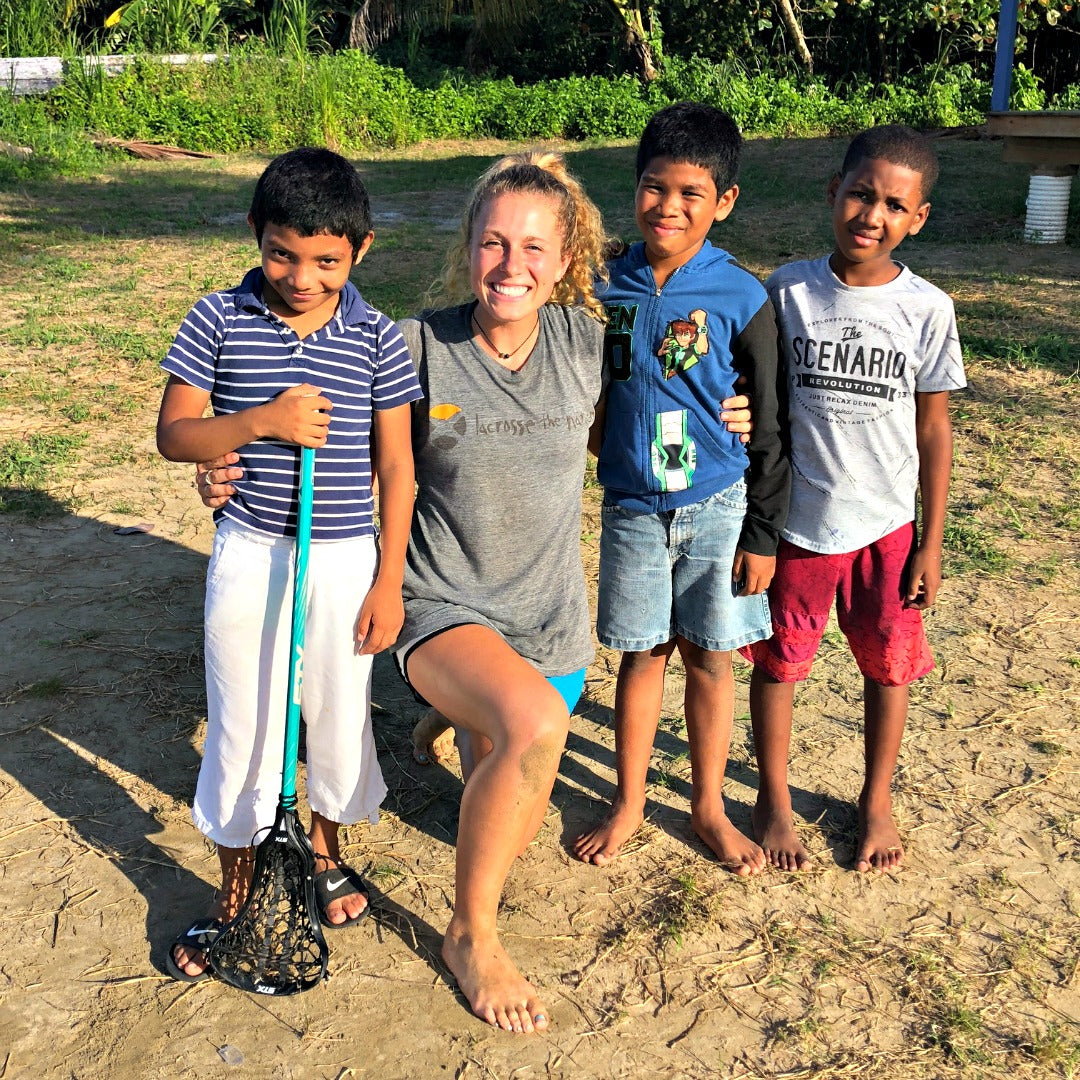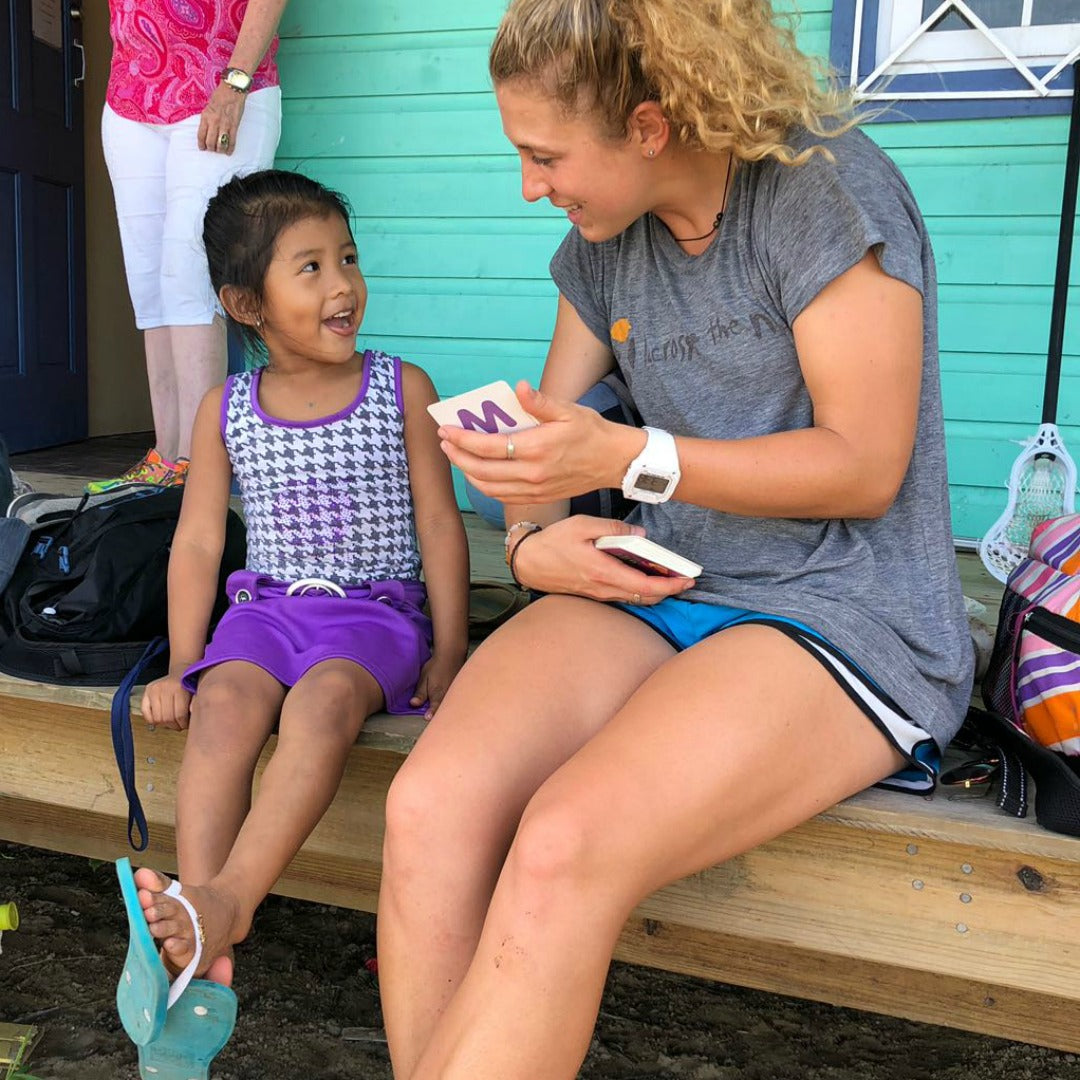Coaches on Coaching: Brooke Wilson
A lifelong athlete, Brooke currently serves on staff of the sport-for-development organization, Lacrosse the Nations, as the Communications and Development Director. Brooke attended the University of Richmond, where she enjoyed a career as a Division I NCAA student-athlete playing lacrosse while completing a BA in Healthcare Studies. Her participation in athletics was paired with outside achievements as a member of the Kappa Alpha Theta Service Fraternity and executive member of the university’s Student Athlete Advisory Committee.
Upon graduation, she pursued her interest in international development with a focus on community health. As a Program Director for Lacrosse the Nations, she implemented the first girls-only lacrosse program in the country of Nicaragua, while successfully training a local coaching staff of seven to take over the coordination of all youth sport and education programming within one year. Brooke’s passion and commitment to sport leadership continues in her role as head coach and manager of all girls’ lacrosse programming at Linganore High School in Maryland.
Why do you think lacrosse can be an international unifier and a bridge from the U.S.?
Well as for the origins of lacrosse, in Onondaga playing lacrosse was “medicine” used to heal, connect, and lift the spirits of the members of the community. I think we can see the idea of lacrosse as the “medicine game” still present in players and fans today. Those who play the game share a uniquely strong passion for it and for seeing it spread.
Lacrosse’s unique history lends to its unique nature now. Lacrosse is definitely not a well-known sport in the communities where Lacrosse the Nations works. Most student-athletes we work with have never seen anything like it. But something about it hooks them.
Through implementation of lacrosse in various communities, we open a space where everyone — boy, girl, young, old, local, passerby — are all interacting together and learning on an even playing field. No one has any advantages over the other. Even our U.S. volunteers who come to teach in our programs may be considered gurus of the sport, but within our programs, they have to work through their explanations, lesson, and fostering connections all in a foreign language. So, they too are brought into this mutual experience of learning from those students that they have come to “teach.”
All of these unique aspects about using lacrosse in our programs make it a magical experience to witness when all parties step onto the field. Everyone wants to soak everything in that they can, to learn from each other about the sport, about culture, about effective ways to communicate and succeed. The practices start with a group of strangers with nothing in common and end with a group coming together as a unified team. It’s the medicine game at work.
 What attracted you to join Lacrosse the Nations after such a successful playing career?
What attracted you to join Lacrosse the Nations after such a successful playing career?
What drew me to volunteer was much different than what compelled me to stay. I graduated from University of Richmond with a public health degree and not much of an idea as to how I wanted to apply it, besides the fact that I wanted to help empower others to lead good lives.
Lacrosse had been such a staple in my life up until that point. I loved the game, I was good at it, and didn’t want my relationship with it to end. Lacrosse the Nations seemed like a perfect opportunity to do something I had never done before — buy me some time to find a career while helping others, and keep a stick in my hand.
What became clear to me within my first day at LtN practices in Nicaragua was just how much the game had given to me. Friends, family, confidence, the opportunity to attend an extremely pricey college to extend my education, the ability to travel to a foreign country I had never even heard of before… I could go on and on. These kids I met on my first day with LtN had none of what I had. None of the things I thought I regarded as valuable. But what did they have? A beat-up stick in their hands and an old, torn, Swax Lax ball spilling its contents along with dust from the field up into their faces every time they caught it in their stick. The magic in their eyes as they played will forever be imprinted in my memory.
Never had I looked at a lacrosse stick that way. Never had I slipped on a rock and glass covered field tearing up my leg while trying to dodge someone just to pop up, brush it off, and proceed with my attack to cage. On my first day of practice I witnessed kids’ absolute and pure joy for what they were doing in the current moment — with no judgment of how well they were doing it or if it would get them somewhere in life. Knowing that an organization could bring such unique joy to a group of people through lacrosse, and also use that same tool to empower them in their decision-making, their self-awareness, and their capacity for educational, personal, and professional development — I was hooked.
What reactions have you seen to the introduction of lacrosse in Central America not only from players but also parents and traditional soccer programs?
Those who are introduced to lacrosse for the first time usually react with:
Confusion: what the heck is she doing with that weird thing in her hand?
Skepticism: why is she doing that? This is a sport?! Where? Who plays this?
Shyness and hesitation
Criticism: yeah but it’s not as cool as soccer (usually fueled by the shyness and hesitation)
….and then they try it. What follows after is ALWAYS:
a smile.
Then after that:
Hunger: “Pass me another one Profesora, one more.”
Questions: “Well why does the ball keep going down at the ground when I throw it? How do I score a goal?”
Determination: “Okay just give me a couple more tries and I’ll get it.”
Accomplishment (and another big smile)
Ending with:
Having to tell them that practice ended 15 minutes ago. “No, we can’t keep going anymore today. No you can’t take that Swax Lax ball home with you! Come back tomorrow at the same time and we get to do it all over again.”
Have you seen any cultural differences between Nicaragua, Panama, Colombia, or Costa Rica?
Hmm, kids around the world are kids at the end of the day. They love to learn new things, accomplish feats they thought they couldn’t, and have fun. It is true, however, that the culture and regions in which we run our programs lend to some differences.
Nicaragua is the most under-resourced place in which we work, so naturally these kids have unique perspectives and ways of approaching challenges. They LOVE the game, and I mean love it. They dive fully into the family it has created for them. They rely on this family and this game in times of challenge, and are accepting of everyone who wants to play. These guys are some of the toughest kids I’ve ever met, have the biggest hearts, and the purest love for the game.
Where we work in Panama and at our past site in Costa Rica, the communities run on island time, based on an economy of tourism. In communities that are so transient with visitors, initiatives, and seasonal-dependent activities, kids at these sites embrace lacrosse as an additional opportunity to play, learn, and stay active. Perhaps the biggest takeaway these kids enjoy is having an adult role model who gives consistent, year-long, undivided attention to their personal development.
As for Colombia, I have not actually been yet! We just opened regular programming in February of this year. What I can tell you is the population we work with is in a rural town, without many recreational activities for kids. Programs are in place to help motivate kids to stay in school rather than skipping or missing to work. Since we began pilot programming, I can make the confident claim that these kids are obsessed with lacrosse.
 More than just lacrosse, how do you integrate the importance of teaching skills around life, education, and nutrition?
More than just lacrosse, how do you integrate the importance of teaching skills around life, education, and nutrition?
This is our whole mission — we don’t run these programs to create amazing lacrosse players (though it is an awesome side result). We run these programs to develop amazing humans who are conscious, self-thinking, and highly motivated contributors within their communities.
Where we do this the most intentionally is through our life skills curriculum. Our life skills curriculum focuses on the traits and values that we as athletes learn through playing sports—often outside the specifics of the game. These include work ethic, motivation, response to failure, teamwork, confidence, and self-awareness. In our practices we:
- Introduce the lesson of the week
- Use lacrosse/games to reinforce the lesson, and
- Follow up each practice with a reflection on what was learned and what we can improve upon next time.
The most integral aspect of successfully teaching these lessons is our coaching staff. LtN coaches serve as consistent, caring role models for our student-athletes. They are trained in youth development and life skills instruction, but more importantly, they are manifestations of these core values present in our kids’ everyday lives. Our coaches grew up in the communities we serve and are seen making responsible decisions, leading healthy lives. They are always there to answer questions, provide motivation, and advise youth in implementing these learned values in their day to day.
How has using Swax Lax balls helped LtN spread the game of lacrosse?
Ease of entry — Less intimidating for kids to try it or join in a practice because of their softness, but still function the same as regular lacrosse balls for running practices or teaching the basics.
Practicality — Swax Lax balls hit the ground and roll less than regular balls. Most of our practice sites are concrete or hard dirt. Swax Lax balls make it 10x easier to keep all of our balls, chase after loose ones, and run a practice smoothly and efficiently.
Motivation — They are so fun looking! Our kids love them. We let the MVP take one home each week to practice. We also do this with new players who want to spend time outside of practice working on their stick skills. Without Swax Lax’s donations every time we need to re-up, our programs would not be able to operate at the level that they do, nor would we make the impact that we have.


 What attracted you to join Lacrosse the Nations after such a successful playing career?
What attracted you to join Lacrosse the Nations after such a successful playing career? More than just lacrosse, how do you integrate the importance of teaching skills around life, education, and nutrition?
More than just lacrosse, how do you integrate the importance of teaching skills around life, education, and nutrition?